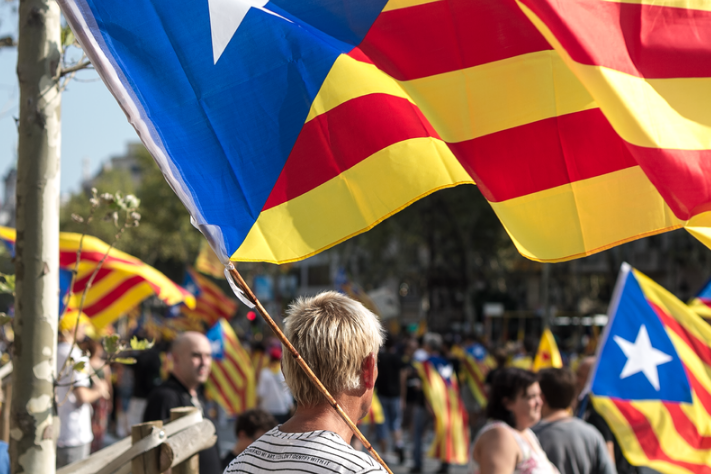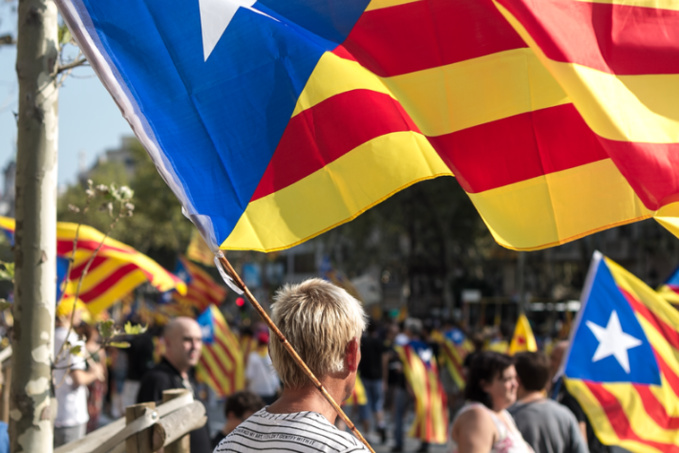Artur Mas is the most senior politician who has been prosecuted for organizing a referendum on independence for Catalonia. Ex-Head of the regional government went to the court along with his deputy Joana Ortega and former Minister of Education of Catalonia Irene Rigau. They are accused of abuse of authority and disobedience to law enforcement agencies.
Yesterday during the hearing, Artur Mas admitted that he was an author of a political initiative to organize the referendum on secession. It turned out that Government of Catalonia simply obeyed his instructions. "Yet, November 9 was not a whim of one man. That was a consequence of democratic elections.", - he said. Recall that in September 2012, Catalonia held early parliamentary elections, in which voters de facto expressed their attitude to the referendum idea. Victory of Artur Mas’ party has opened a way for the vote.
Addressing the judges, Mr. Mas avoided words "referendum" and "plebiscite", and tried explain that the vote was only to identify mood of the Catalans, and had no "immediate legal consequences". At the same time, he said, when Spain's Constitutional Court banned the referendum, the regional government did not violate the law. "We decided to change the format, leaving the old issue (the region’s independence) and the date. What changed is that the voting was organized not by the government, but by outsiders." According to him, the national survey took place solely thanks to efforts of 42 thousand volunteers, rather than local authorities. Ex-prime minister also rejected accusations in disobedience to the authorities, saying that Spain's Constitutional Court did not warn him about any possible consequences of the vote.
For Artur Mas, the proceedings can result in ten years of revocation of the right to hold a public office. On the eve of the trial, the politician made it clear that his position remains unchanged. "We have lost a sense of fear of the state that treats us as subordinates, not nationals, - he told to radio station Onda Cero. - There are many countries that have gained independence, although Constitutions of states, to which they belonged, did not allowed it." Current authorities of Catalonia, headed by Prime Minister Carles Puigdemont agrees with this view. The politician promises to organize a new referendum, results of which cannot be ignored. "If 50% (of voters) plus one person say "yes" to independence, we will have no doubt in proclaiming it", - assured Mr. Puigdemont in his New Year’s address to the nation. Before trial, he delivered a speech in which he called November 9, 2014 a "hopeful day of joy and consolidation of democracy."
At least 40 thousand Catalans who gathered yesterday to protest agree this thesis. Chanting "Independence!", they demanded an end to "politically motivated court" over leaders of the independence movement.
Most likely, Barcelona will keep the same rhetoric during future political negotiations with Madrid. "We can talk (with Catalonia’s authorities), but everyone must obey the law", - said Spanish Prime Minister Mariano Rajoy last Friday. This means that the central government is not going to talk about any legally binding referendum. The most they are willing to is possible slight concessions on specific issues, such as taxation. Minister of Justice of Spain Rafael Catala said that the central government is exploring all possible ways to prevent the referendum, including application of the 155th article of the Constitution, which allows to introduce direct control of Madrid in the autonomy.
source: nytimes.com
Yesterday during the hearing, Artur Mas admitted that he was an author of a political initiative to organize the referendum on secession. It turned out that Government of Catalonia simply obeyed his instructions. "Yet, November 9 was not a whim of one man. That was a consequence of democratic elections.", - he said. Recall that in September 2012, Catalonia held early parliamentary elections, in which voters de facto expressed their attitude to the referendum idea. Victory of Artur Mas’ party has opened a way for the vote.
Addressing the judges, Mr. Mas avoided words "referendum" and "plebiscite", and tried explain that the vote was only to identify mood of the Catalans, and had no "immediate legal consequences". At the same time, he said, when Spain's Constitutional Court banned the referendum, the regional government did not violate the law. "We decided to change the format, leaving the old issue (the region’s independence) and the date. What changed is that the voting was organized not by the government, but by outsiders." According to him, the national survey took place solely thanks to efforts of 42 thousand volunteers, rather than local authorities. Ex-prime minister also rejected accusations in disobedience to the authorities, saying that Spain's Constitutional Court did not warn him about any possible consequences of the vote.
For Artur Mas, the proceedings can result in ten years of revocation of the right to hold a public office. On the eve of the trial, the politician made it clear that his position remains unchanged. "We have lost a sense of fear of the state that treats us as subordinates, not nationals, - he told to radio station Onda Cero. - There are many countries that have gained independence, although Constitutions of states, to which they belonged, did not allowed it." Current authorities of Catalonia, headed by Prime Minister Carles Puigdemont agrees with this view. The politician promises to organize a new referendum, results of which cannot be ignored. "If 50% (of voters) plus one person say "yes" to independence, we will have no doubt in proclaiming it", - assured Mr. Puigdemont in his New Year’s address to the nation. Before trial, he delivered a speech in which he called November 9, 2014 a "hopeful day of joy and consolidation of democracy."
At least 40 thousand Catalans who gathered yesterday to protest agree this thesis. Chanting "Independence!", they demanded an end to "politically motivated court" over leaders of the independence movement.
Most likely, Barcelona will keep the same rhetoric during future political negotiations with Madrid. "We can talk (with Catalonia’s authorities), but everyone must obey the law", - said Spanish Prime Minister Mariano Rajoy last Friday. This means that the central government is not going to talk about any legally binding referendum. The most they are willing to is possible slight concessions on specific issues, such as taxation. Minister of Justice of Spain Rafael Catala said that the central government is exploring all possible ways to prevent the referendum, including application of the 155th article of the Constitution, which allows to introduce direct control of Madrid in the autonomy.
source: nytimes.com



















